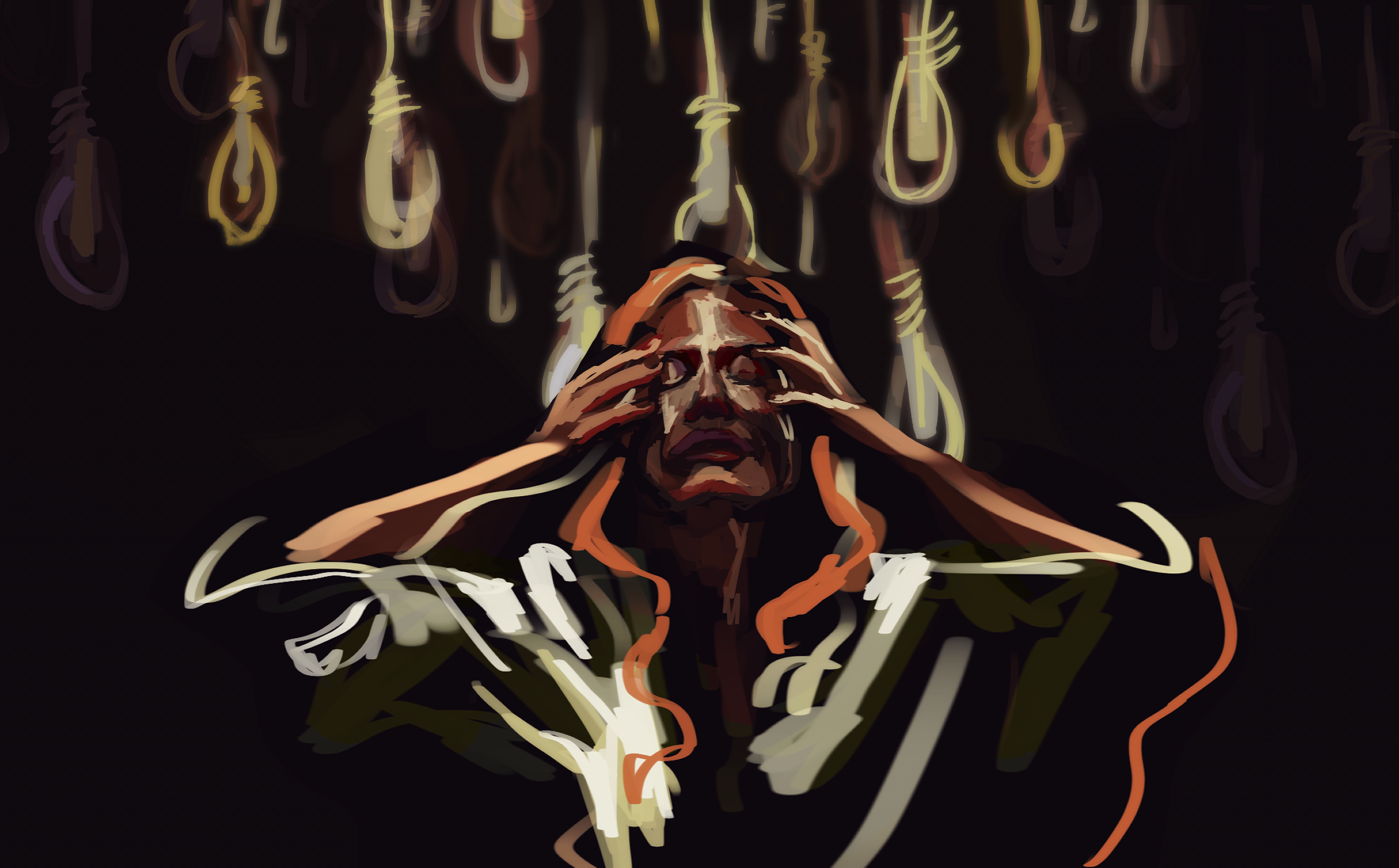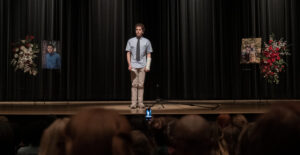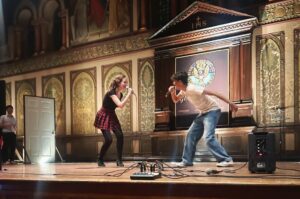Sidelined on a dark shore, a downcast woman waits silently upon a piano bench and listens to the gentle, rippling waves. Penelope’s opening scene is a portrait of tranquility: outfitted in satin garments of jade, lime, and cyan, she shimmers like a sea-glossed gemstone.
Eventually, her voice pierces this serenity, signaling morning’s swift arrival. As sunbeams stream into the scene, bright piano chords ring at her fingertips, and the dawn-dipped plum stage lights warm into electric magenta and fiery orange. Rather than a reignition of hope, the ushering of a new day twists like a knife for this solemn figure: her husband has still not returned home.
Penelope, an original one-woman musical written by Alex Bechtel running at Signature Theatre through April 21, retells Homer’s The Odyssey through the perspective of Penelope, the wife whom Odysseus abandons for 20 years. Like other stories that center the overshadowed narratives of famous figures’ partners (see Priscilla (2023)), Penelope sees its eponymous lead navigating devastating emotions of neglect. She grapples with one gnawing question: when is it time to let go of the man I love? Anchored by Jessica Phillips’s haunting yet humorous portrayal of Penelope and a brilliant, string-centric score, Penelope is a classical reimagining of mythical proportions.
Amid the blazing sunrise, a quintet slowly takes their places onstage, delivering two simmering instrumental melodies, “A Very Long Wait I” and “One by One,” which delay Phillips’s lyrical introduction for dramatic effect. Like Penelope’s treacherous wait for Odysseus, the audience is forced into patience, given space to grow restless. When we finally meet our lead, the lyrics of “Penelope” acutely reflect this frustration; underscoring her wailing pleas for her husband’s return is her uncertainty regarding how much longer she can keep hope alive.
Juxtaposing this somber beginning, the sonically upbeat “Drunk Iliad” lifts the tempo with a jazzy score and bouncing piano. This sarcastic number sees Penelope clutching a mostly guzzled whiskey bottle while lamenting her husband’s unknown post-Trojan War whereabouts and her complicated, insecurity-laced relationship with Helen of Troy, the woman Odysseus initially favored. Like other songs in the “woman on the verge” musical theater catalog (see “I’m Breaking Down” from Falsettos), “Drunk Iliad” wonderfully balances exposition with palpable, surmounting exasperation, resulting in a song hysterical in more ways than one.
Phillips’s interpretation of Penelope is impressive on multiple fronts. Given the musical’s unique simplicity—a one-woman show with no elaborate sets, costume changes, or props besides a bottle of booze—the production’s success depends almost entirely on her performance. Thankfully, the role could not be in safer hands. Phillips’s voice is stunning; there is a delectable, slightly raspy quality to her tone which perfectly encapsulates the character’s desperation and aggravation. Acting-wise, the Dear Evan Hansen alumna brings the entire palette of Penelope’s complex interiority to life, seamlessly shifting between moments of yearning, annoyance, melancholia, faithlessness, and renewed optimism. Phillips’s evident understanding of this nuanced character is even more impressive considering the expedited rehearsal process; as director Eva Steinmetz revealed after the show, “This woman learned this show in two weeks.”
Phillips’s impressive ability to compensate for the sparse set shines when Penelope invites the crowd to tour her beachside bungalow—a place haunted by memories of her marriage. Without any visual scenery or communicative props, she mimes a series of distinct, repeated gestures to illustrate Penelope’s treasured yet hollowed-out space. Easily one of the production’s most memorable scenes, Penelope describes every hallmark of her house in excruciating detail, including a framed wedding day photograph and a horde of unsavory suitors. When “showing” the crowd her tree-carved bed, a flood of devastating flashbacks washes over her. Overcome by a swelling sorrow, Penelope recalls countless nights spent sleeping alone, sticking her leg out to check if Odysseus might be on his rightful side. Again and again, the cold sheets provide a cruel answer.
The centerpiece of Penelope’s home is her loom. Like the original tale, Penelope promises her suitors that she will settle down as soon as she finishes weaving a funeral shroud for her dearly departed husband. Yet, desperate to keep hope alive, she unravels her progress every night. In “Weaving,” lyrics such as “I make landscapes, I pull them apart” showcase her tragic arrested development: any semblance of forward momentum eludes her. Torn between wanting to live out the rest of her life and holding out hope for Odysseus’s eventual return, Penelope is stuck in limbo.
This emotional purgatory prompts Penelope to seek solace in religion. Though she prays to Athena every day, she never receives a response … that is, until the number “Tired of Faith.” As she furiously bemoans Athena’s radio silence, the chandelier of lightbulbs dangling above her suddenly starts shaking. Each instrumentalist gazes skyward with glazed-over eyes. Supernaturally overtaken, they begin speaking and singing Athena’s words in unison—a proper Greek chorus.
Susanna Mendlow’s mesmerizing cello forms the song’s bedrock, jauntily tiptoeing across the melody. Similarly, when Penelope unleashes a barrage of questions about her husband’s disappearance, Athena tiptoes around the truth, insisting that Penelope should continue to blindly trust her supposedly benevolent intentions (intentions which become increasingly suspicious as Athena refers to the lost hero as a “macho,” “strapping,” “sinewy” “hunkfest” during her spiel). Though undoubtedly comical—the number concludes with plastered smiles and golden confetti—this ping-ponging conversation also features moments of fascinating contemplation. For instance, when Penelope asks how the goddess of wisdom could possibly have such a gaping blind spot in her knowledge, Athena responds in true erudite fashion: “Penelope, no one sees everything. We know what we see and we only see the things we look for.”
Penelope brazenly embraces duality throughout its 70 minute runtime. The set and story are simple, yet Penelope’s labyrinthine mental landscape is anything but. She craves her lover’s return but simultaneously fantasizes about a life unencumbered by longing altogether. She is the titular lead, but her battles with dependency illuminate the growing pains of writing your own story. Though we encounter Penelope at a time of tremendous uncertainty, one thing remains certain: Penelope is a dazzling production well worth your time.




